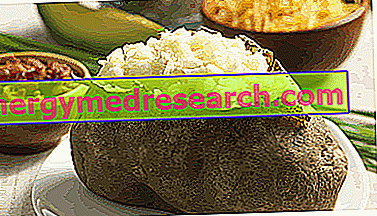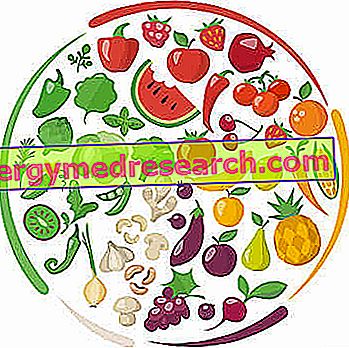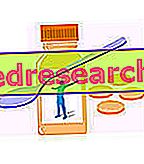The high- calorie diet is a diet that aims to increase the intake of all nutrients with food (energy, plastics, mineral salts, vitamins, etc.), in order to promote a possible weight gain useful for recovery of the desirable physiological weight, in a subject characterized by underweight, and therefore potentially MAL-nourished.

Underweight and IMC
The term "underweight" is a name (or rather an evaluation) that indicates " a person with a body mass index (BMI, in English BMI) equal to or less than 18.4 points ", beyond which (from 18.5 in su) normality is included (up to 24.9 points), then overweight (up to 30) and finally obesity.
The IMC is calculated using the formula: weight in kg / ( stature in m) 2 ; does not take into account the growth, the level of hydration and the ratio between lean mass / fat mass, therefore it is unsuitable for the evaluation of athletes, athletes, children under 18 and subjects with pathologies that alter body composition in significantly (eg profuse interstitial edema, ascites, etc.).
High-calorie diet: how much to eat MORE?
The high-calorie diet must meet the following requirements:
- Truthfulness and relevance: it is essential that the operator style the high-calorie diet accurately and periodically evaluate the effects on the subject
- Nutritional balance: the high-calorie diet is distributed in a classical manner and, at most, can determine an increase in the protein fraction up to the upper limits recommended by nutritional research institutes
- Well calibrated overall energy surplus: the high-calorie diet requires an increase in total energy equal to and not exceeding 10% of normocaloric; ultimately, assuming the requirement of 1800kcal of an underweight subject, the relative high calorie diet will be equal to: 1800kcal + (10% * 1800kcal) "ie" 1800kcal + 180kcal = 1980kcal.
Applications in the clinic
As anticipated, the high-calorie diet is necessary to gain weight and avoid any malnutrition, both partial and general; in other words it is diametrically opposed to the low-calorie diet (advantageous in weight loss).
In our country, the high-calorie diet is less used than the low-calorie diet because the underweight is an infrequent pathological condition; usually, people with a BMI <18.5 fall into the following cases:
- Hypo-nourished and malnourished: aware and / or with a disorderly / disorganized diet, lack of appetite, physically impeded, patients with eating disorders (anorexia nervosa), economically and / or socially disadvantaged, etc.)
- Periodically depressed and / or emotionally unstable
- Third age (malnutrition often with multifactorial aetiology)
- Low-cost constitution
- etc.
Unfortunately, the FOOD high-calorie diet (therefore without the aid of supplements, parenteral or enteral feeding with tube), while representing a potential cure in ALL the cases mentioned above, is not always applicable; certainly it does NOT present any contraindication in the treatment of skinny men with constitution and awareness or with a disorderly / disorganized diet, but by carefully observing other cases, one can realize how challenging and problematic this nutritional intervention could be.
Whoever lacks appetite (or ignores it) fails to sustain the "commitment" of a normal diet, since it is already perceived as excessive! In these cases, the high-calorie diet is a real forcing and is frequently accompanied by: swelling, sense of constipation, prolonged loss of appetite, fatigue, nausea, belching, etc.
In subjects with physical impediments, the application of the high-calorie diet does not depend on the will of the subject; if the handicap is motor or cognitive it is sufficient to guarantee (as if it were simple ..) that the subject is accompanied by a family member or by an assistant in charge of facilitating the management and consumption of meals; if the defect lies in chewing, the high-calorie diet will be predominantly liquid and third-party intervention is not essential.
It is also inadvisable to prescribe a high-calorie diet in malnourished and / or underweight individuals if they are suffering from eating disorders (frequently dragged into the clinic by family or friends but NOT consenting or FITTIZI); they (usually suffering from anorexia nervosa or border-line) spontaneously refuse food and sometimes, despite the success of psychiatric therapy, following the chronicization of the disorder there may be significant impediments of an organic nature to the digestive system (such as the restriction gastric).
Needless to describe what could be the obstacles of the high-calorie dietary prescription to economically or socially disadvantaged people; in poverty, the purchasing power of families or individuals is drastically reduced (or reduced to zero), considerably affecting the diet. It is not necessary to bring examples of the 3rd or 4th world (certainly of great interest but far from the Italian reality): even in developed countries like ours, the growing economic hardship tends to profoundly change both the healthiness and the nutritional style of families ; let's start by pointing out that economic necessity favors the increase in work commitments (at best ...) MA consequently reduces the time spent on food supply and preparation. This involves inadequate juvenile nutrition education and the possibility of hypo- or poor nutrition. These young people should then undergo a high-calorie diet to restore the desirable physiological weight but, obviously, a question arises: if at first there was no parental control over the ordinary food management of the children ... with which conditions they will fulfill their duties during the course of high-calorie therapy? The risk is that of a hypercaloric, bankruptcy, or worse, maladaptive therapy.
It is therefore deducible that, where the problem is a concrete LACK of economic resources or the absence of a family nucleus, the hypercaloric diet would be even more unsustainable, therefore inapplicable.
Depressed or emotionally unstable (eg following mourning) may manifest (similarly to DCA patients, but with different etiology) a refusal to eat; it follows that: the treatment of any malnutrition and the consequent underweight should first of all be based on a correct psychological / psychiatric approach to which, at a later or simultaneous time, the hypercaloric diet useful for restoring the desirable physiological weight is approached.
Geriatric patients and the elderly in general are frequently affected by malnutrition, although (for metabolic reasons) this occurs more rarely with underweight (muscle mass is reduced more rapidly than fat) but begins with symptoms and clinical signs attributable to deficiencies nutritional. The elderly frequently return to different situations among those mentioned above: depressed, economic and / or socially disadvantaged, with physical, inappetent impediments, with a disorderly / disorganized diet, etc. Administering a high-calorie diet is undoubtedly indicated, albeit in compliance with any pathologies or related clinical conditions (gastro esophageal reflux, hypochloridria, dysphagia, diverticulosis, diabetes, hypertension, etc.); it is also logical that, similarly to the single cases described above, from the beginning it is fundamental to focus the cause of the eating disorder and (where possible) resolve it before administering the high-calorie diet; otherwise, the result would be (with good probability) of a bankruptcy nature.



